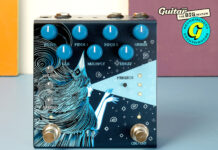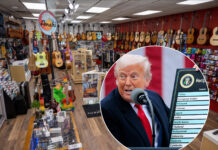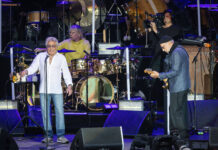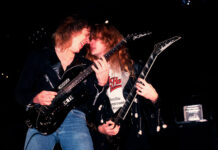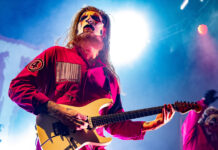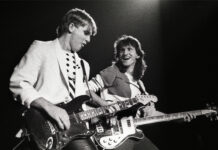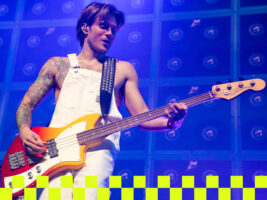
McFly’s Dougie Poynter on why the bass is “an unsung hero” and his obsession with the Fender Meteora
“I’ve got friends who are like, ‘which part are you playing in that song? I can’t hear it…’ I’m the thing that’s making the seat rumble!” Explains an exasperated Dougie Poynter. The McFly bassist is very loyal to his instrument. Over 20 years have passed since he joined the band, and it’s a marriage that remains sweeter than ever. His only wish? That others would celebrate and love the humble bass guitar as much as he does.
READ MORE: Blu DeTiger on designing her “dream” bass, and cultivating the new generation of bass players
McFly – completed by vocalists/guitarists Tom Fletcher and Danny Jones, plus drummer Harry Judd – formed back in 2003, and while bands like Blink-182 and Sum 41 were already smashing it in the US, McFly were instrumental in forging Britain’s own 00s pop-rock scene. Their 2004 debut album, Room On The 3rd Floor, shot straight to number one in the UK, with their music growing into an integral part of the era’s teenage dirtbag aura, and even acting as a gateway for fans to hook into other guitar-driven acts like Green Day, Fall Out Boy, Paramore, or their fellow Brits, Busted.
Thou shalt not speak of the latter though, as McFly and Busted are currently locked into a rivalry. This September, they’ll be heading out on the road with each other once again, but this isn’t the chummy McBusted supergroup format they’ve toured as before. This time, they’ll be going head-to-head for Busted Vs. McFly, and according to Poynter, it’s going to be quite the clash.
“Last week we started talking with our production people about how we actually want the show to flow and what kind of stupid stuff we can get away with,” he says with a grin. “I think the nature of both of our bands, we can get away with doing some theatrical things every now and again. I mean we all play instruments, so there’s only tiny moments, or like, ‘how can one member get from one side of the arena to the other? Is there some sort of magic trick we can do?’ It’s very WWE, so we want to incorporate that as much as possible in the two teams.”
Accompanying McFly on stage will be a rather stunning American Ultra II Meteora bass from Fender, which Poynter has admittedly become besotted with – a love affair which we will get the scoop on in just a moment – but this is a romance that actually started back in 2022, when Fender launched its Player Plus Meteora bass.
“I’m five foot eight, I’m a pretty small dude. And most bass players are traditionally massive, with massive hands. That’s why for ages I played the Music Man Sterling, because it was a bit smaller. I got into a habit of changing the pickups in that Music Man to Quarter Pound Seymour Duncans because I preferred that tone to it, but I liked the shape. And then when the Meteora came out, Fender asked if I’d like to try it, and I instantly fell in love,” Poynter shares.
“I think around the same time that we were making the [Power To Play] album, and it was perfect timing. I also joined the Laney team, so I changed my amplifier, and I got a [SansAmp] Geddy Lee preamp as well.”
Star Girl
Fender’s American Ultra II series launched in October last year, with Poynter bagging its Solar Flare Meteora. He’s still deciding on a name for this yellow-y green glory, having already taken to Instagram to show it off. Fans have put their case forward for it to be named after everyone’s favourite animated Ogre, Shrek. More sensibly, it tends to be a choice between Poynter and his guitar tech, on whatever is easiest to shout across during a live show, but “it probably will end up being called Shrek”.
View this post on Instagram
A post shared by Dougie Poynter (@idougahole)
Packing Ultra II Haymaker Humbuckers, a modern “D” neck profile, and an Ultra II Active Bass Preamp with S-1 switching – this is a bass one could describe as rock-ready, though it still offers the versatility to knock down your output a peg or two; a useful addition for a band like McFly, who will shift between bitey rock to tender tones. Poynter says it’s his new workhorse bass, and that it’s fully comprehensive of all of his live-play needs.
“I [feel] like I [can] reach everything really easily. The shape of the body itself when we’re playing live, like the weight and where the weight goes depending on where your arm is, and how easy it is to go from the first fret all the way up the neck, it just really works,” he explains. “The look of it, you might not think that it does because it’s got such a heavy arse on it, but that for me really helps because all the weight is kind of stuck down the bottom end and it doesn’t move. I feel like I can just kind of let go of it.
“Within McFly, the type of sound that I’m going for is everything from ‘80s rock to pop punk, to a ‘60s Paul McCartney kind of tone. I switch from a pick to my fingers, so we’ll have a song like Where Did All The Guitars Go?, which is supposed to be like 80s rock. I play that with a pick, and then the next song might be a song called Obviously, which has kind of a walking groovy bass line that I’ll use with my fingers for and the bass can do all of it. It’s just how I play it that affects the sound. [I’m] really obsessed with it which makes it even more fun to play. It makes you want to pick it up.”
Fender’s Justin Norvell has described the American Ultra II instruments as the “sports car” of its product lineup, and says they are guitars that “don’t fight you, but get out of the way”. Poynter agrees: “It has the anti-buzz thing going on in the pickups as well, but it still feels like it has so many traditional values in it. It feels like a really good classic bass, it doesn’t feel mega futuristic. And although it does lean more into rock, it’s so easy just to knock some of that tone back and play any kind of style.”
Image: Mauricio Santana/Getty Images
Where We’re Going, We Don’t Need Roads
The market of guitar in the 2020s is growing ever rich with new innovation. Albeit sometimes overwhelmingly saturated for some, it does prove one thing – our instrument is thriving, and the demand for guitars is living strong. Not only that, but learning to play is arguably easier than ever, too.
“I’m kind of envious of people starting bands today because of how accessible everything is,” Poynter admits. “One of my favourite bass players is Guy Pratt [Pink Floyd, Madonna, Michael Jackson]. There’s just something about his style of playing, and I had all these questions about what he does. Now you can just Google and he’s made a video about it and will tell a story, or there’ll be a quick video of him doing a gear rundown. You’re like, ‘oh, right, that is literally the chain that he’s using. I can do that.’ Whereas me growing up, I’d have to sit there with Kerrang! TV on, and watch the music videos like, ‘he’s got that in the video, but that doesn’t mean that’s what he did in the studio.’ So I think it’s really good.”
Image: Jim Dyson/Getty Images
All About The Bass
“Bass is sometimes a bit of an unsung hero that you would definitely miss if it’s not there. We don’t get many moments to really show off,” he adds, fighting its case for a little more acknowledgement once again.
“I kind of feel like bass doesn’t get spoken about as much, about how important bass tone is. Obviously bass players, producers and musicians can hear the bass tone and they can tell the difference, but it’s like baking a cake, it’s an ingredient that goes in the mix that you can’t taste, but it’s really important to the raising of the cake or something,” he says. “I know that’s a weird analogy.”
It does make bloody good sense, though. Where would we be without the walking basslines of Michael Jackson’s Billie Jean? What would music be like if we didn’t have songs like The Beatles’ Come Together, or Fleetwood Mac’s The Chain? Imagine a world without the craft of Paul McCartney, Flea, or Kim Gordon.
Poynter’s duty as bassist is one he treasures and celebrates: “I love the role that I have within a band, the connection between the guitars and the drums, and it just being my responsibility on the stage to lock in with Harry, our drummer. That’s something we take great pride in. We have a certain connection when we’re rehearsing, like, ‘is that little tiny thing working there? Okay, you wanna do a fill here, what the hell should I do to complement that?’ I love it. It really suits me,” he says. “I feel like I’ve got the best job in the world.”
McFly’s head-to-head tour with Busted kicks off this September. They will also play Download Festival on Friday 13 June.
The post McFly’s Dougie Poynter on why the bass is “an unsung hero” and his obsession with the Fender Meteora appeared first on Guitar.com | All Things Guitar.
Source: www.guitar-bass.net

